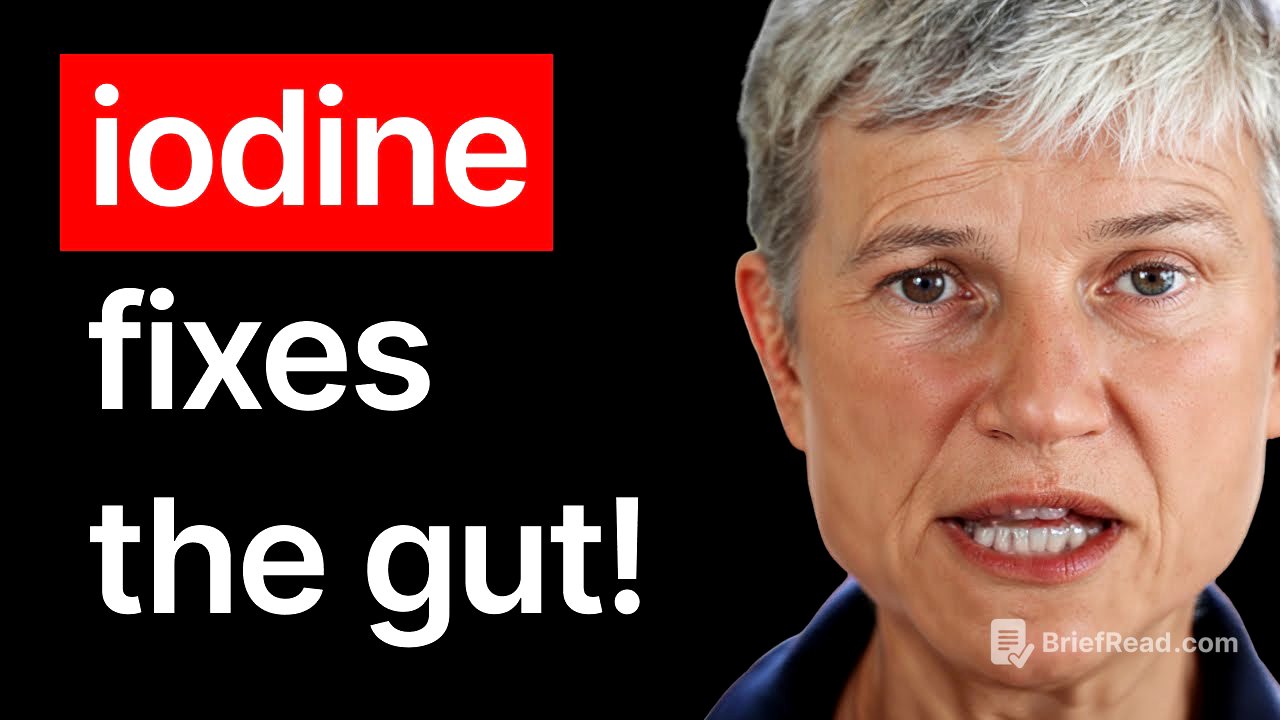TLDR;
This podcast episode features Dr. Sarah Myhill, a functional naturopathic doctor, discussing gut health and how to fix it. She argues that modern diets, high in carbohydrates and processed foods, are detrimental to gut health, leading to issues like upper fermenting gut, leaky gut, and inflammation. Dr. Myhill recommends a paleo-ketogenic or carnivore diet to starve harmful microbes and emphasizes the importance of supplements like Vitamin C, iodine, and MSM for killing these microbes and detoxifying the body. She also touches on the impact of gut health on weight loss, the role of exercise, and the dangers of glyphosate.
- Modern diets are disastrous for gut health due to high carbohydrate and processed food content.
- A paleo-ketogenic or carnivore diet can help starve harmful microbes in the gut.
- Supplements like Vitamin C, iodine, and MSM are crucial for killing microbes and detoxifying the body.
Intro [0:00]
Dr. Sarah Myhill emphasizes the importance of gut health, stating that it's the first thing she addresses with patients, regardless of their specific health issues. She highlights three tools she uses: vitamin C for protection against heart disease and degeneration, iodine for maintaining IQ levels, and MSM (methylsulfonylmethane), a biologically available form of sulfur. She challenges the notion that milk kefir is beneficial for gut health, asserting that one cannot significantly alter the microbiome through diet alone.
Understanding Gut Health and Common Issues [2:07]
Dr. Myhill believes that most people unknowingly suffer from gut issues due to incorrect diets. She explains that the human gut evolved to primarily digest a carnivore diet, with vegetables introduced later. Modern diets, rich in carbohydrates and ultra-processed foods, overwhelm the gut's ability to remain sterile, leading to fermentation in the upper gut and metabolic problems.
The Dangers of Modern Diets and Misconceptions [5:48]
Dr. Myhill identifies high-carbohydrate and high-sugar foods as detrimental to gut health. She points out that modern fruits are bred to be excessively sweet, leading to high sugar intake. Crushing fruits into juices concentrates the sugar even further. The yeast on the outside of fruits can cause fermentation in the gut, leading to the auto-brewery syndrome, where alcohol is produced internally. She also mentions that modern diets cause an abnormal microbiome and allergies, contributing to gut problems.
Exploring the Upper Fermenting Gut [8:31]
The gut is a 30-foot tube, where the first 25 feet should be near sterile for digesting meat and fat, while the last five feet house the microbiome, which ferments fiber and benefits the body. The microbiome programs the immune system, ferments fiber into short-chain fatty acids (ketones), and produces vitamins and neurotransmitters. The upper fermenting gut occurs when the first 25 feet become colonized with bacteria and yeast, leading to inflammation, leaky gut, and the production of toxins like ethyl alcohol, propyl alcohol, and ammonia.
Identifying Symptoms of Gut Problems [14:40]
Microbes in the upper fermenting gut cause inflammation and leaky gut, leading to various health issues. These microbes consume vitamins and minerals, produce toxins, and can translocate into the bloodstream, causing inflammation in muscles (fibromyalgia), joints (arthritis), and the gut lining (inflammatory bowel disease). They can also affect the skin (chronic heriticaria), brain (psychosis), lungs (intrinsic asthma), and kidneys (kidney disease).
The Impact of Gut Health on Weight Loss [15:56]
Impaired gut function can hinder weight loss by affecting satiety hormones like leptin and ghrelin. Ultra-processed foods, while tasting good, don't trigger the release of these hormones, leading to constant hunger. An underactive thyroid, often caused by excessive alcohol consumption or iodine deficiency, can also contribute to weight loss difficulties.
Understanding Gut Health and Fat Storage [19:26]
Fat is stored where the immune system is active. An upper fermenting gut and leaky gut cause the immune system to be constantly active in the abdominal area, leading to fat accumulation in the stomach, resulting in an "apple shape." This body shape is associated with a higher risk of heart disease due to bacteria and yeast spilling into the bloodstream, causing inflammation. Other symptoms of gut problems include fatigue, foggy brain, heartburn, bloating, constipation, and gut pain.
Starving and Killing Gut Microbes [31:14]
To fix the gut, it's essential to starve the microbes by adopting a very low carbohydrate diet, such as the carnivore diet. Microbes exist in active and cystic phases, so it's important to both starve and kill them. Dr. Myhill recommends vitamin C (5 grams daily) and iodine as contact killers for microbes. She also suggests MSM, which kills microbes in the aerobic upper gut and acts as a prebiotic in the anaerobic lower bowel.
The Role of Exercise in Achieving Ketosis [39:42]
To achieve ketosis, it's important to keep carbohydrates as low as possible and test ketone levels using blood ketone tests. Being in ketosis indicates that there is no upper fermenting gut. Exercise helps burn off sugar and increase muscle mass, which raises the basal metabolic rate and clears sugar from the system.
Addiction to Sugars and Carbohydrates [42:24]
Humans are prone to addiction, often seeking short-term gain at the expense of long-term pain. It's important to recognize personal addiction triggers and practice abstinence. Dr. Myhill uses a personal addiction test to identify foods she can't moderate.
Superfoods for Gut Health [45:45]
Affordable superfoods for gut health include organ meats (liver, kidneys, heart), paleo bread made from linseed, tinned fish and meat, eggs, and cheap cuts of meat. Vegetables like peppers, lettuce, rocket, and celery provide essential nutrients and a "crunch factor."
The Role of Iodine and Supplements [48:56]
Bacon is acceptable despite nitrites, especially when taking vitamin C. For iodine, Dr. Myhill recommends Lugol's iodine (two to three drops in water at night). Vitamin C and iodine should be taken at least two hours apart. MSM (half a teaspoon daily) is also beneficial for connective tissue, detoxification, and improving four-phase water.
Detoxing Heavy Metals and Toxins [52:46]
Heating regimes (running, sunbathing, saunas, Epsom salt baths) help eliminate toxins stuck in fat by warming up subcutaneous fat and diffusing molecules onto the skin's lipid layer, which can then be washed off. Heavy metals, which get stuck in tissues, require chelating agents like EDTA, DMSA, and DMPS to be removed through urine. MSM may also help pull out heavy metals.
The Impact of Glyphosate on Gut Health [55:37]
Glyphosate, a widely used pesticide, can kill up to 54% of microbes in the microbiome. It is used as a desiccant just before harvesting crops. To minimize exposure, prioritize buying the best quality food possible, go as carnivore as possible, follow a detox regime, and opt for organic vegetables and fruits when available.









